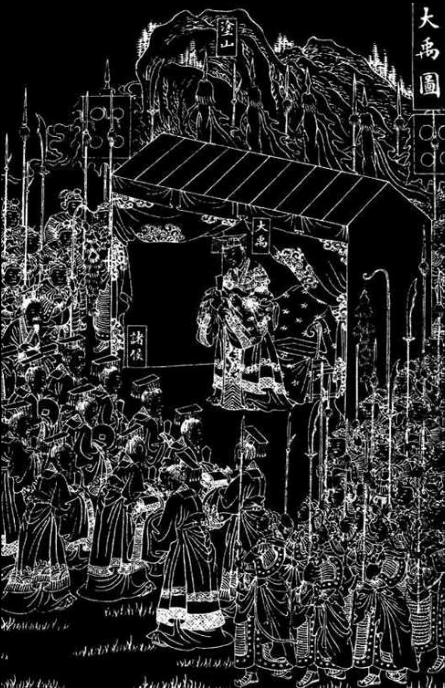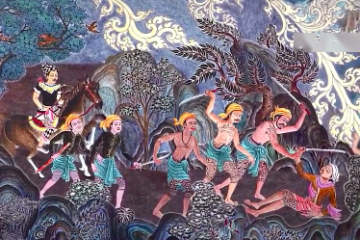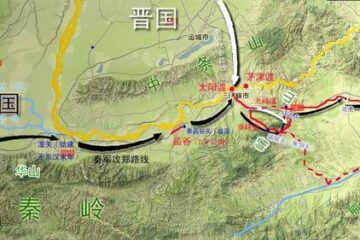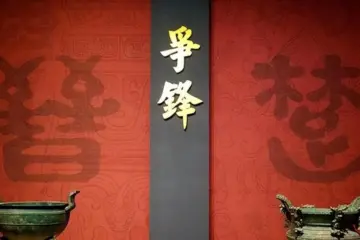_《中国神话故事》华语动漫频道_Moment-1024x576.jpg)
During the reign of Emperor Yao, floodwaters surged and surrounded the mountains, submerging the hills and causing great distress to the people. Yao sought someone capable of managing the floods, and his ministers recommended Gun. However, Yao said, “Gun is someone who goes against the will of heaven and brings shame to his family. I cannot employ him.” The ministers responded, “Compared to others, Gun is the most talented. We hope you give him a chance.” Thus, Yao accepted the recommendation of ministers and appointed Gun to handle the floods. After nine years, the floods had not receded, and Gun had achieved no results. Emperor Yao then sought other talents and found Shun. Shun was appointed to carry out the duties of the emperor and oversee the realm. During his inspections, Shun discovered that Gun had accomplished nothing in flood control, so he banished him to Mount Yu, where Gun died. People across the land believed that Shun’s punishment of Gun was justified. At this time, Shun recommended Gun’s son, Yu, and allowed him to inherit his father’s work.
_《中国神话故事》华语动漫频道_Moment1-1024x576.jpg)
Yu felt saddened by his father Gun’s failure in flood control and the subsequent punishment, so he worked hard, pondered diligently, and stayed away for thirteen years, not daring to enter his own home even when passing by. Yu lived a very simple life in terms of food and clothing, but he offered generous sacrifices to the ancestral spirits. His residence was modest, but he spared no expense in digging canals and trenches. When walking on flat ground, he used a carriage; when traveling on water, he used a boat; when traversing muddy terrain, he used a wooden sled, and when climbing mountains, he wore shoes with sturdy soles. Yu carried with him leveling instruments, measuring ropes, compasses, and rulers in order to open up the land of the world, connect the roads, construct dams, and survey their mountains. Yu instructed Yi to provide the people with rice seeds and taught them to plant in low-lying, moist areas. He also commanded Houji to supply emergency food for the hungry. In areas lacking food, Yu redistributed resources from affluent regions to balance the food reserves across the land. Additionally, Yu established standards for tribute offerings based on the circumstances of each region and the transportation conditions of high mountains and large rivers.
_《中国神话故事》华语动漫频道_Moment-1024x576.jpg)
Yu opened up nines mountain roads and diverted nine major rivers. Dams were also constructed near lakes and marshes, and vassals from all over the kingdom came to pay tribute.
The territory extended eastward to the sea and westward to the desert, from the north to the south. Emperor Shun rewarded Yu, using it as an opportunity to announce the success of flood control to the entire world. From then on, peace and stability prevailed throughout the land.
Gaoyao took on the role of a judicial officer to govern the people. Gaoyao explained his principles, saying, “We must focus on moral cultivation, long-term planning, and collectively assist the emperor.” Yu asked, “Indeed, but how should we proceed?” Gaoyao responded, “Ah, it depends on the skillful utilization of talents and the stability of the people.”
_《中国神话故事》华语动漫频道_Moment1-1024x576.jpg)
Emperor Shun turned to Yu and said, “Share your suggestions as well.” Yu prostrated himself and said, “Ah, what should I say? Every day, I only think about diligently fulfilling my duties.” Gaoyao pressed Yu further, asking, “What does it mean to diligently fulfill your duties?” Yu replied, “Floodwaters surge and engulf the sky, overwhelming the tall mountains and rushing onto the hills. The people of the world are threatened by these floods. When walking on flat ground, I use a carriage; when traveling on water, I use a boat; when traversing muddy terrain, I use a wooden sled; when climbing mountains, I wear shoes with sturdy soles, and along the mountain slopes, we cut trees and set up landmarks. I deliver rice and fresh meat to the people. I diverted the flow of the nine major rivers, leading them into the vast seas, and directed the field channels into the great rivers. I and my subordinates provide emergency food for the people. In times of food scarcity, we redistribute grain from prosperous regions to supplement the shortages in other areas, or we relocate the people. As a result, the people have settled down, and the nations are peaceful.” Gaoyao said, “Indeed, this is a magnificent achievement.”
From then on, Gaoyao held Yu’s virtues in even higher regard and commanded the people to follow Yu’s example. If anyone disobeyed the orders, they would be punished.



